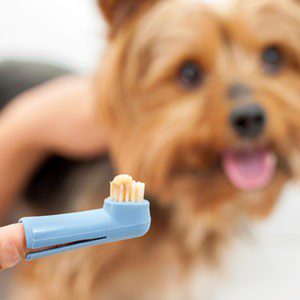Does your canine pal sometimes ‘smile’ when he’s happy? Dogs make the cutest expressions! Fido doesn’t particularly care if his teeth are pearly-white. However, that doesn’t mean dental care isn’t important. Just like people, dogs can develop some very painful dental issues. In this article, a Dawsonville, GA veterinarian discusses caring for your pet’s teeth.
Common Issues
Did you know that over half of adult dogs have some form of gum disease? Although gum disease is painless and asymptomatic at first, it can contribute to some extremely dangerous health issues, like heart disease. Fido can also be afflicted by other dental problems, such as misalignments, overcrowding, and abscesses. Dogs also sometimes crack or break their teeth on hard objects.
Warning Signs
Your pup can’t tell you if his choppers hurt, so it’s up to you to watch for warning signs. Bad breath is a common one. Other red flags include ropy, stringy, or bloody drool; visible swelling; tartar buildup; and bloody smears on toys or dishes. You may see some behavioral changes, such as shying, withdrawal, grumpiness, or reduced interest in play. Dental issues can also affect dogs’ eating habits. Fido may dribble food, chew on one side of his mouth, take longer eating, and/or start preferring softer foods.
Checkups
We recommend having Fido’s choppers examined at least once a year. At home, if you see any of the signs we’ve listed above, call your vet immediately to schedule an exam. Once a diagnosis has been made, your vet can discuss treatment options. These may range from a simple cleaning to extractions or other procedures.
Home Care
Brushing your dog’s teeth is really the best way to keep them clean. Start slow, to let Fido get used to the process. At first, just gently rub his teeth and gum with your finger. Work in lots of praise and ear scritches. Next, add some pet toothpaste. You can use a finger toothbrush or gauze if you like. Finally, start using a doggy toothbrush. If your furry buddy isn’t having it, ask your vet for advice on other options. Dental flakes, oral rinses, and dental-formula treats and chews are all beneficial. Also, make sure that your pooch always has plenty of clean water and suitable chew toys.
Do you know or suspect that your canine companion has dental issues? Contact us, your Dawsonville, GA vet clinic, today!

